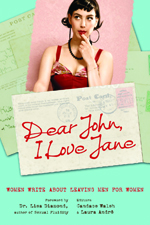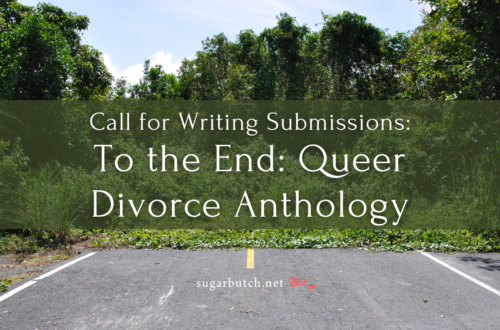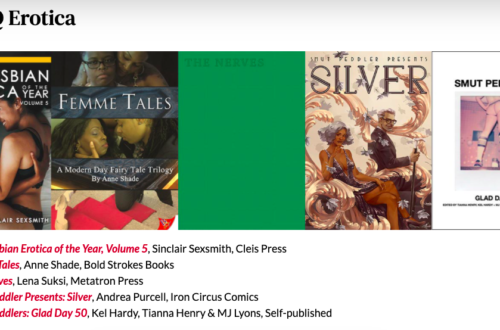This site contains explicit writings on kink practices, dominant/submissive relationships, and queer kink erotica (among other things). All characters in role play or non-consent scenes are consenting adults. Content warnings are included.
 Seal Press recently released a much needed addition to queer identity narratives in the anthology Dear John, I Love Jane: Women Write About Leaving Men for Women edited by Candace Walsh and Laura Andre.
Seal Press recently released a much needed addition to queer identity narratives in the anthology Dear John, I Love Jane: Women Write About Leaving Men for Women edited by Candace Walsh and Laura Andre.
What do you think of when you think about a coming out story? Typically in this culture, the main character of a coming out narrative tends to be a teenager, either pre-teen or late teens, someone who either has always been a bit different or is suddenly hit with the sexual revelation that they might be gay. Despite that coming out as a teenager seems, to me, to be actually a somewhat recent phenomenon, and that people coming out even ten or fifteen years ago were more likely to be college-age rather than high school age, which I would largely attribute to the rise of the Internet and the vast amount of information easily accessible by just typing “gay” into a search engine or, at this point, speaking one word into a search program on a smart phone, there is still a significant lack of literature available about people who come out later in life. Though the coming out process continues to happen younger and younger, the dominant stories are still about people in their tumultuous twenties, which is frequently when we formulate and articulate our adult sexual identities, often for the first time.
But what about someone coming out in their late thirties, forties, fifties? What about someone who has spent most of their life heterosexual, married and raising kids? Often, these stories are not reflected in queer literature and culture. We tend to value and legitimize the folks who express that we “always knew” that something was off about us, queer identities that started giving hints in childhood and were full-on signs by our adolescences.
Which is why this anthology is a much needed addition to the body of work on queer identity; we have so few stories about what it’s like to form these identities later in life. In this book, “later in life” is defined quite broadly, as some of the participants are still quite young and have, in my mind, had fairly typical coming out experiences.
While I was reading through these essays, I felt that it was important to keep in mind that they are personal reflections about the authors’ own experiences, and while there is great value in telling those stories, and this book is beginning to fill a neglected gap, they are not necessarily radical or particularly theoretical, and in fact perpetuate many stereotypes about lesbianism and gender in particular. In fact, the consistent commentary on gendered lesbian stereotypes in so many of the essays made me wonder if those stereotypes were a reflection upon the editors’ beliefs. Perhaps the reader was meant to assume that these were former stereotypes that the narrators held, and that their understandings have deepened and become more complex, but none of the essays directly addressed the vast inaccurate outsider observations toward the lesbian communities and none of the essays directly took on any sort of understanding of how complex gender identity and expression is in the queer and lesbian worlds.
I know that a complex understanding of gender is a lot to expect, and that I am particularly critical of representations of gender that are heteronormative and perpetuating stereotypes, but I was disappointed in the consistent portrayal throughout this book. I do think it is an important to add to the dominant paradigm of coming out and coming to queer identities, and certainly it gives a solid base on which others can now build. But I am cautious in recommending it, since I think it perpetuates more stereotypes than it challenges.




Thanks for your thoughtful observations. Can you be more specific about the following?
“the consistent commentary on gendered lesbian stereotypes in so many of the essays made me wonder if those stereotypes were a reflection upon the editors’ beliefs.”
Yes. I didn’t want to include quotes from the many places I’d marked in the book because as critical I am of stereotypical representations of gender, I still think it’s important that this book be out in the world and I didn’t want to necessarily dissuade people from reading it.
What I noticed was that the stereotypes about lesbian gender were so frequent in so many of the essays that, looking at the book from an editor’s perspective, I would have made a point to include other essays that debunked those stereotypes and showed examples of people who had come to understand that they were just that—stereotypes—and not necessarily The Truth about the lesbian community. If I hadn’t received any of those types of submissions, I might have attempted to commission them specifically, or at least address that consistent, glaring theme in the introduction. Because the book showed none of that, nor an understanding of the stereotypes around lesbian gender expressions, I wondered if that was actually a reflection of the editors’ own beliefs.
If it had been one essay depicting such stereotypes I would have felt critical of that perspective, but also acknowledged the other parts of value that that particular author’s story contributed to the book, but because those were consistent through so many of the essays, it made me more critical of the editors’ choices.
Does that make more sense?
Hi Sinclair,
Thanks again for the very thoughtful review! The issues you raise with respect to the book’s content evince an obviously well-honed attention to the complexities of gender and sexuality. Just to clarify, it was never our intent as editors to promote stereotypes—we regret that possibility, and we are grateful that you’ve called out that particular aspect of our book. Our stance was basic: to present a book that contained personal narratives focused on the experiences of formerly heterosexual women leaving relationships with men to enter into or pursue relationships with women. We recognize that our use, and our writers’ use of these terms (men, women, gender, sex, etc.), is pretty mainstream and not reflective of a more nuanced understanding of them. Most of our writers were not very familiar with the differences between sex and gender, for example. It would’ve been great, indeed, to explore that more in the book, but we were more focused on getting the basic stories out there for the average reader. We’re glad that you have enabled us to explore these issues in further depth, because we definitely support critical thinking.
Best regards, Laura & Candace
Thanks for the book rec – not sure I understand what you’re talking about in terms of stereotyping but I guess I’ll figure it out when I read it?
I am one of those women (not literally, I’m not in the book) so I would love to read about others like me.
Let me know how you like it, if you think about it—I’d be curious if you were irked by the gender stuff the same way I was, or if it felt like the stories were really relatable and resonated with your own experiences.
i wanna check this out..
Interesting… thanks for the honest review. I’m also one of “those women.” I’ve been eyeing the book for a while, but to be honest, have put it off for fear of not being able to see myself in its pages. Looks like it might be a good education in spotting gender sterotypes, though… off to put a library hold on it!
Hey, also sort of one of “those women” — came out in my early thirties, was married, raising a toddler… I plan to read this book, with caution, because as previous posters have said, it’s refreshing to have my experience addressed. I mostly just wanted to thank you, Sinclair, for writing about it. It’s so strange to straddle both queer and straight worlds as I co-parent my daughter, and it can be a little bit alienating. It’s nice to feel included!
Hi there. Don’t mean to belabor things, but after reading the review and all the comments I’m *still* confused by what’s meant by “stereotypes about lesbian gender.” All the men are masculine and all the women are feminine? That might seem to fit here, since women leaving men might be a bit more traditionally-minded, but I still don’t know.
For me, stereotypes I’ve heard people labor under are like, ALL lesbians are into butch/femme or NO “real” lesbians are into butch/femme. Or that all lesbians are relatively feminine, but only in a crunchy granola sort of way. Yes, those are different stereotypes. There are probably others, but nothing else is coming to mind right now . . .
Ramona— Yes, I mean things like your second paragraph. There are many moments in the book where the contributors write things like, “But I know how to use a hammer! I can’t be a femme!” or, “All lesbians are hairy and unattractive, I can’t be a lesbian!” Those are stereotypes about gender, lesbian gender in particular, about physical traits and the “mannish” way lesbians are, about how femmes can’t do anything tough or strong. There are other sexual stereotypes too, but the gender is what really stood out for me.
I’m one of “those” women. I’m 48, in the process of ending my marriage and very happily involved with a woman. Here is my take on the book as a member of the intended audience.
While I see what you are saying about gender stereotypes honestly when you are a middle-aged woman in the throws of turning her life its ear you have bigger fish to fry. You are feeling lonely and isolated. You are questioning yourself and what your life has meant up until now. And, you are wondering what the rest of your life will look like.
I really appreciated the book. I needed to know that I was far from alone. Unless you live in a big metropolis the gay community is hard to break into, especially here in the south. I’ve had a bitch of a time making friends and becoming the slightest bit integrated. This book came along at a time when I needed a sense of community but could not find none. It least gave me the chance to hear the voices of others who have walked in my shoes. They are rather unique shoes after all.
I’m glad it spoke to you. And, as I wrote many times in the review, I think it’s a really important book and I’m glad the collection is out there.